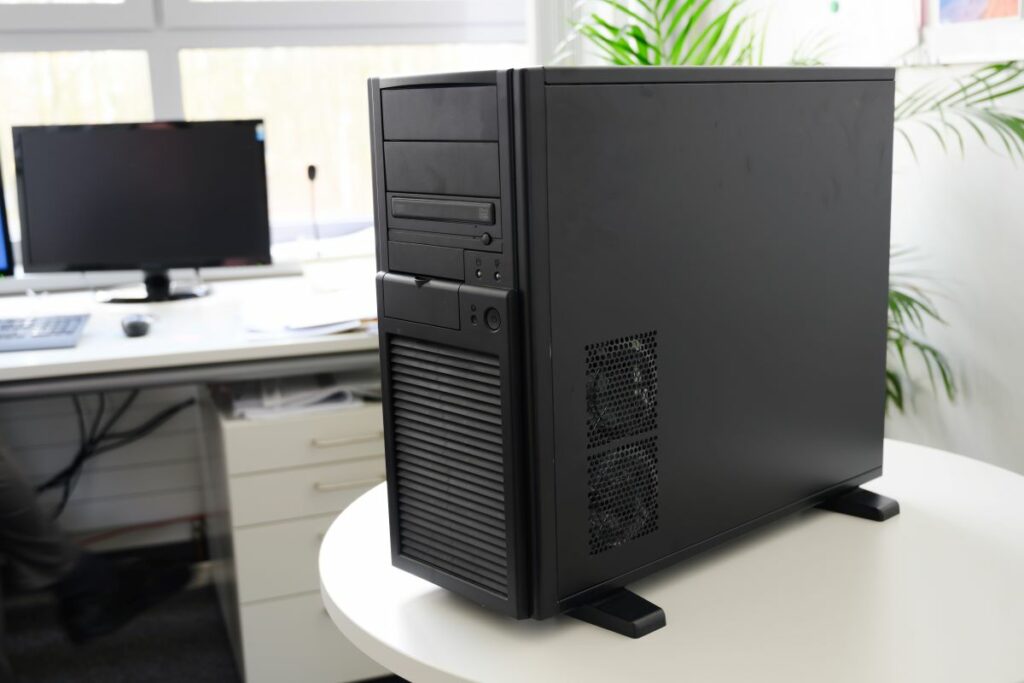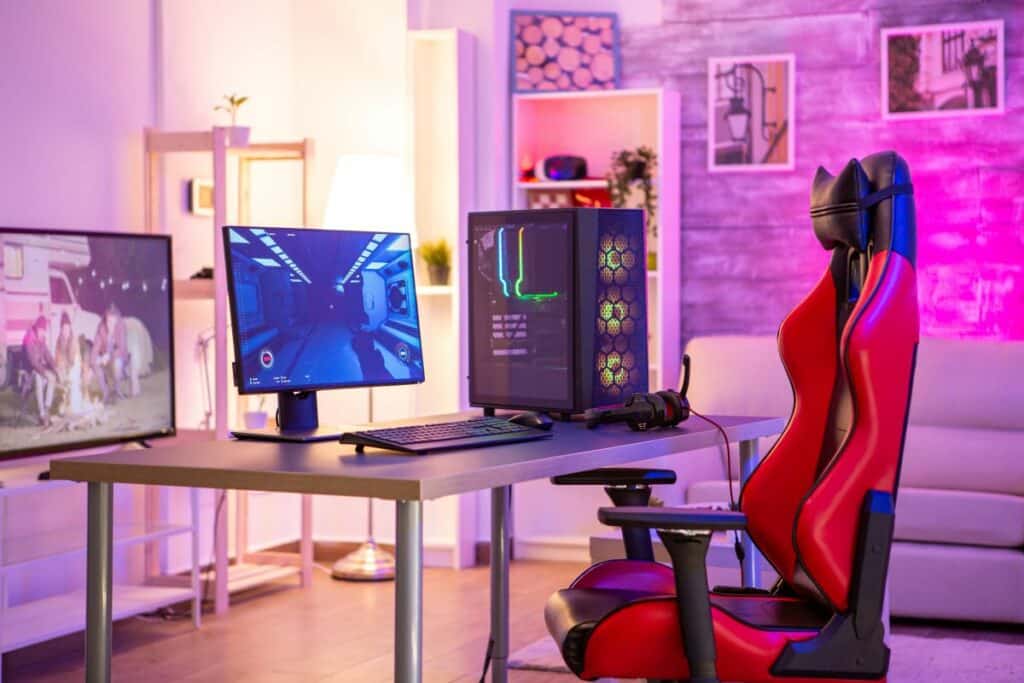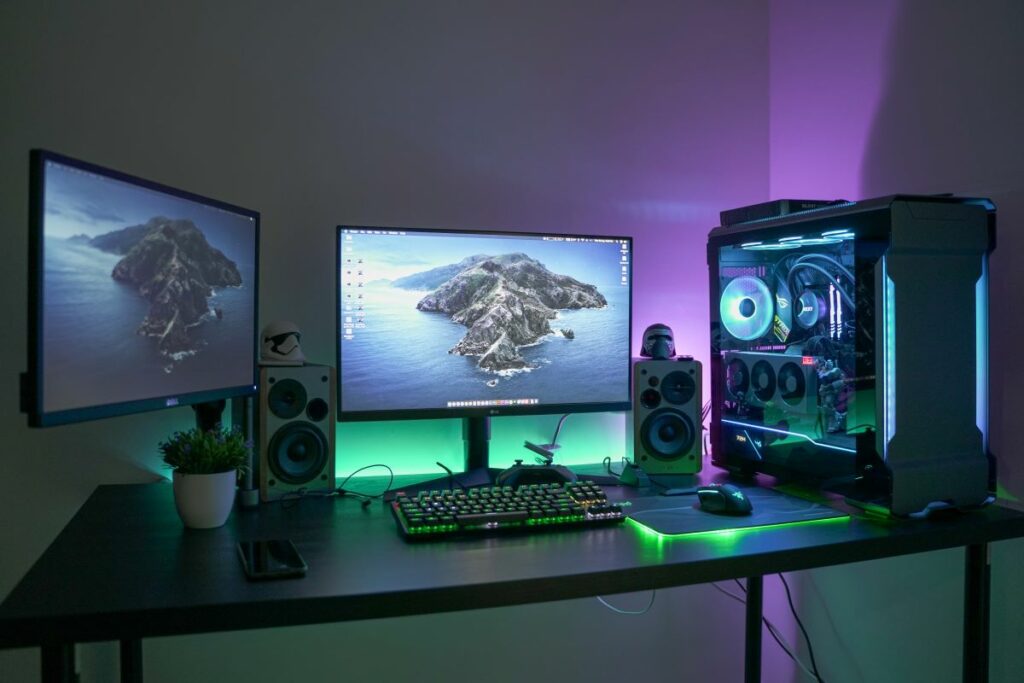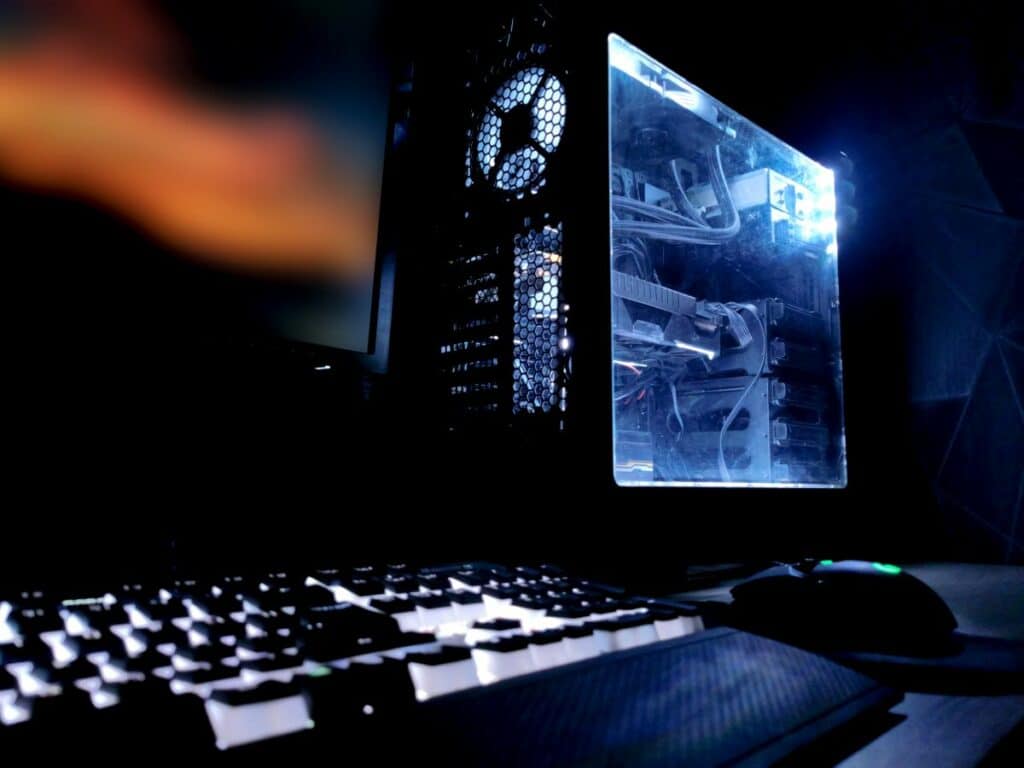the essentials in brief
A desktop PC is a stationary device, which is usually placed on a desk.
Stationary computers impress above all with their good quality Performance. Here you can find out what you can also benefit from with such a device.
That depends entirely on your needs. For gamers, a desktop PC is usually better. You can read why here.
Are you looking for a computer that works with your keep up with demanding tasks and gaming needs can? Then you should definitely take a look at desktop PCs! Desktop computers have been a staple of the work and gaming landscape for decades, offering a customizable work environment that laptops can't afford. We give you an overview of the Benefits of powerful devices.
Contents
What is a desktop PC actually?
A desktop PC (personal computer) is a mostly stationary computer, which is usually placed on a desk or table. It consists of various components, such as a housing, a motherboard, a CPU (Central Processing Unit), RAM, a hard drive, a graphics card, a Power Supplies and other peripheral devices such as mouse and keyboard.

Desktop PCs are not normally used on the move, but are for the Use in a fixed place designed. They are widely used in offices, schools and other work environments, as well as at home.
Often offer the stationary computers more power and flexibility than laptops and tablets because they have larger cases that offer more space for powerful components. They are also easier to repair and upgrade as they are often made up of individual components that can be easily swapped out.
key fact box
The first commercially successful desktop PC was the IBM PC, released in 1981. The IBM PC became the standard for desktop computers and laid the foundation for personal computer development in the decades that followed.
The development of work on the computer
Working on the computer has changed a lot over time and is due to ever new innovations continue to make great strides.
In the early years of computers, systems were extremely bulky and expensive. They became mainly by governments and companies used for scientific calculations and data processing.
The introduction of the desktop PC in the 1980s allowed more people to Computers at home and at work to use. With the advent of the Internet in the 1990s and proliferation of mobile devices in the 2000s, the way we work on computers has changed radically.
Today, many people work from anywhere and use cloud computing platformsto access and collaborate on their work. The development of smartphones and tablets has also made it possible to work remotely.
The Development of artificial intelligence and machine learning also has an impact on the way we work on computers. Automation tools can help us complete routine tasks faster and more efficiently.
Important: Computers' ability to process and analyze complex data has created unprecedented opportunities in fields such as medicine, science and financial analysis.
Stationary PC: an outdated model?

In the age of the home office and mobile working, the concept of the desktop PC seems a bit outdated. However, even though mobile devices such as laptops and tablets are becoming more popular, there are still many situations in which a stationary PC is the better choice at a hunt.
For example, desktop PCs are often more powerful than laptops or tablets and offer more space for large screens and keyboards. This can be particularly important for demanding applications such as gaming, graphic design, video editing, or scientific calculations that require large amounts of processing power and memory.
In addition, desktop PCs are also usually easier to repair or upgrade since they are made from individual components exist that easily exchanged can become. In contrast, mobile devices are often more difficult to repair or upgrade as they often have fully integrated components.
Additional information: Ultimately, the choice between a stationary or mobile device depends on the specific needs and preferences of the user, and there is no “right” or “wrong” choice.
Using the desktop PC: advantages and disadvantages

Anyone who works on the computer knows the small difficulties of the desktop PC, but also his great benefits. Here you can find them at a glance:
Advantages of a stationary computer:
- Performance: Desktop PCs tend to be more powerful than laptops, offering more storage space and processing power.
- Flexibility: Desktop PCs offer more flexibility in component selection and are easier to upgrade.
- Ergonomics: Desktop PCs offer more options for customizing the work environment, such as larger monitors and ergonomic keyboards and mice.
- Costs: Desktop PCs are often cheaper than laptops or tablets with comparable performance.
Weaknesses of a stationary computer:
- Mobility: Desktop PCs are stationary and cannot be easily transported from one place to another.
- footprint: Desktop PCs take up more space than laptops or tablets and can be bulkier.
- Energy consumption: Desktop PCs typically use more energy than laptops or tablets and can be more expensive to run.
- volume: Desktop PCs can be noisier than laptops or tablets due to the fans needed to cool the components.
Tip: It often makes sense to have both a desktop PC and a laptop - for all eventualities.
Stand PC vs. Laptop

Nowadays, many people prefer to use their laptops instead of working on a stationary computer. This has some advantages, but also disadvantages.
Advantages of a laptop:
- Mobility: Laptops are portable and can be easily transported from one place to another.
- Space saving: Laptops take up less space than desktop PCs and are easier to store.
- Energy Efficiency: Laptops use less energy than desktop PCs and are therefore usually cheaper to run.
- Integrated components: Laptops often have built-in components, such as a webcam, speakers, and microphone, that are included in the purchase price.
Disadvantages of a laptop:
- Ergonomics: Laptops are not ergonomically designed and can therefore lead to additional back and neck strain if you do not use a riser.
- Performance: Compared to desktop PCs, laptops often have lower performance, which can have a negative impact on speed and efficiency. In addition, they are often more difficult to upgrade.
- Battery life: Most laptops have limited battery life, which means they need to be charged regularly. If the battery is empty and there is no socket nearby, this can lead to an interruption in work.
- repair and maintenance costs: When a laptop needs to be repaired it can be expensive as most laptops are not as easily repaired as desktop PCs. In addition, maintenance costs, such as replacing batteries, can also be expensive.
Additional information: With a remote desktop connection you can control your desktop PC from your laptop. All you have to do is install remote desktop software and connect. In this way, you can access all files and programs on your desktop PC from your laptop.
Gaming PC: Stationary and powerful

If you are a gamer, you will probably find that a Standing PC can hardly be replaced by a laptop is. And there are a number of good reasons for that.
A desktop PC performs better than a laptop in most cases. You can do it with one strong processorto excellent graphics card and lots of RAM equip what enables him run demanding games smoothly.
Unlike a laptop, you can use your desktop PC upgrade at any timeto improve performance. If you want to play new games in the future, you can easily add new hardware components to ensure your system keeps up.
That can do a lot for you too Save money, so you don't have to keep buying the latest gaming laptop with fully integrated components.
With a gaming PC, it's also easier to install effective and efficient cooling, which keeps the components at an optimal temperature. This is especially important if you're playing games for a long time, as overheating can affect performance.
Overall, a desktop PC offers many advantages over a laptop when it comes to gaming. If you serious gaming want to operate and need the best possible performance, a gaming PC is the best choice.
Tip: You can also connect multiple displays to a stationary computer for a better gaming experience.
Desktop PC: The powerhouse at your desk
Desktop PCs offer one multitude of advantages, which are irreplaceable when working and gaming. Compared to laptops, desktop computers are more powerful and offer more storage space, making them ideal for demanding tasks such as video and image editing or gaming.
With the option of installing powerful graphics cards and processors, stand-alone PCs can also do that latest games with highest framerates To run.


